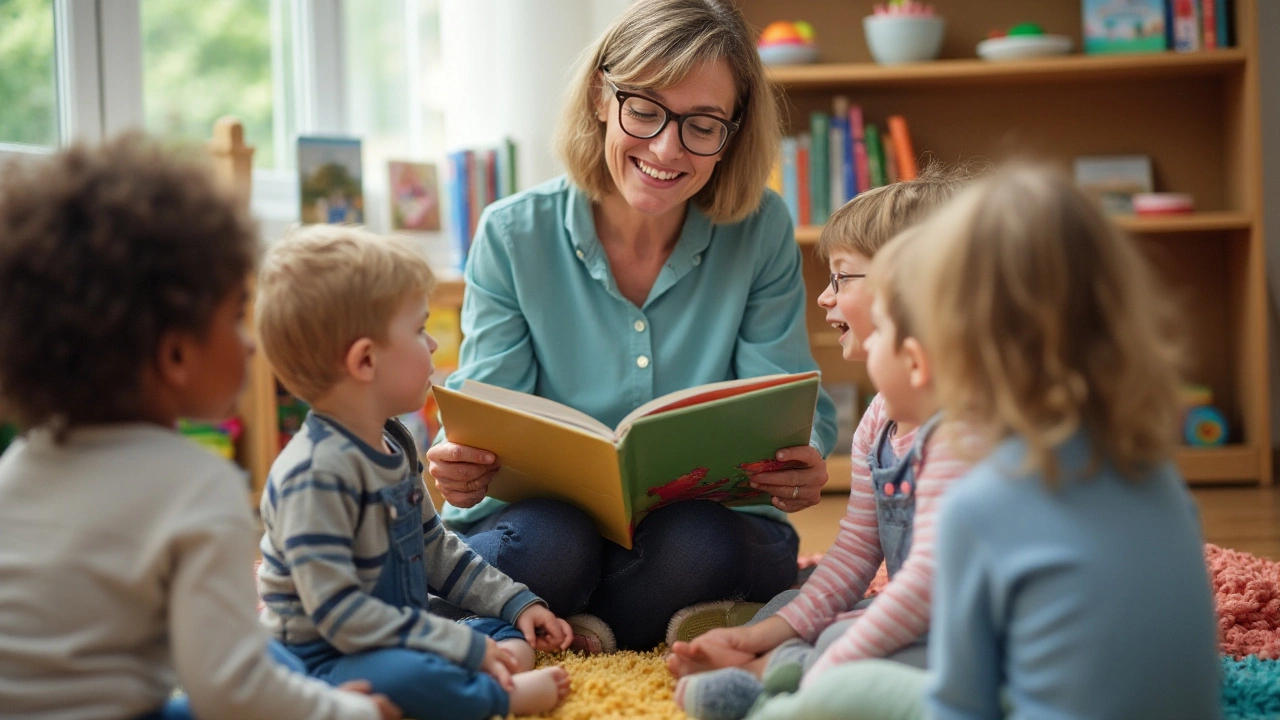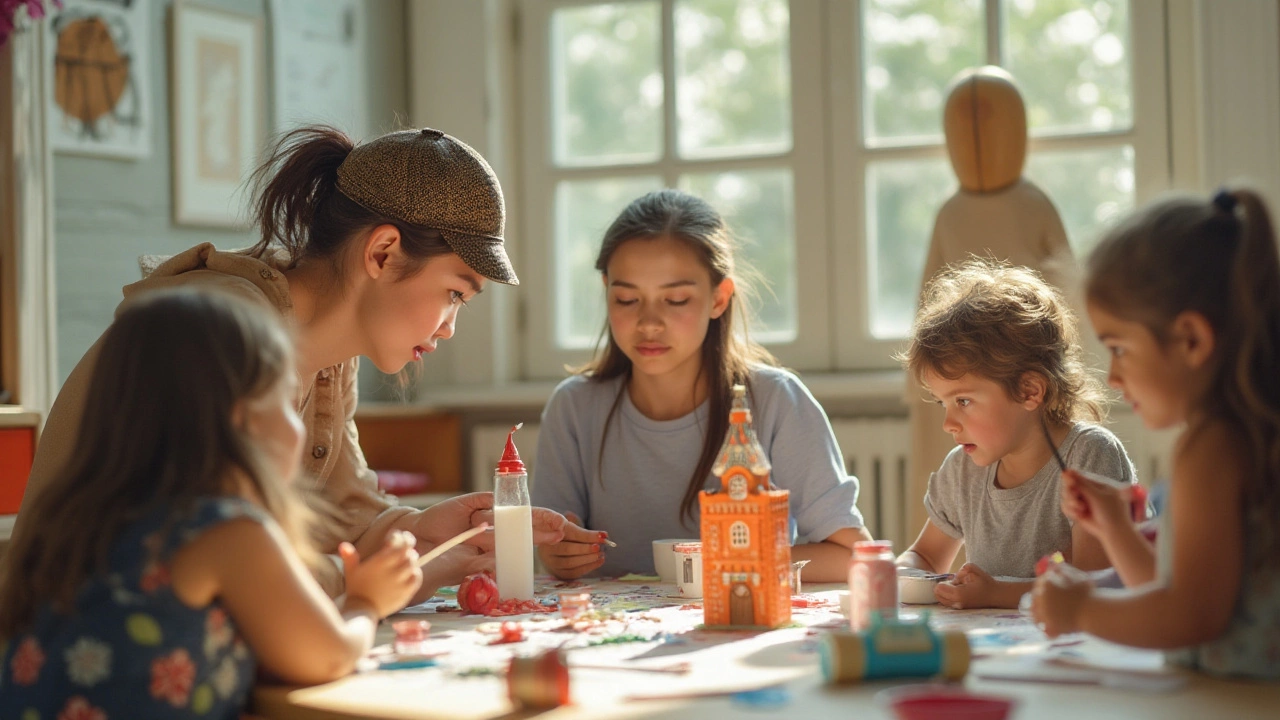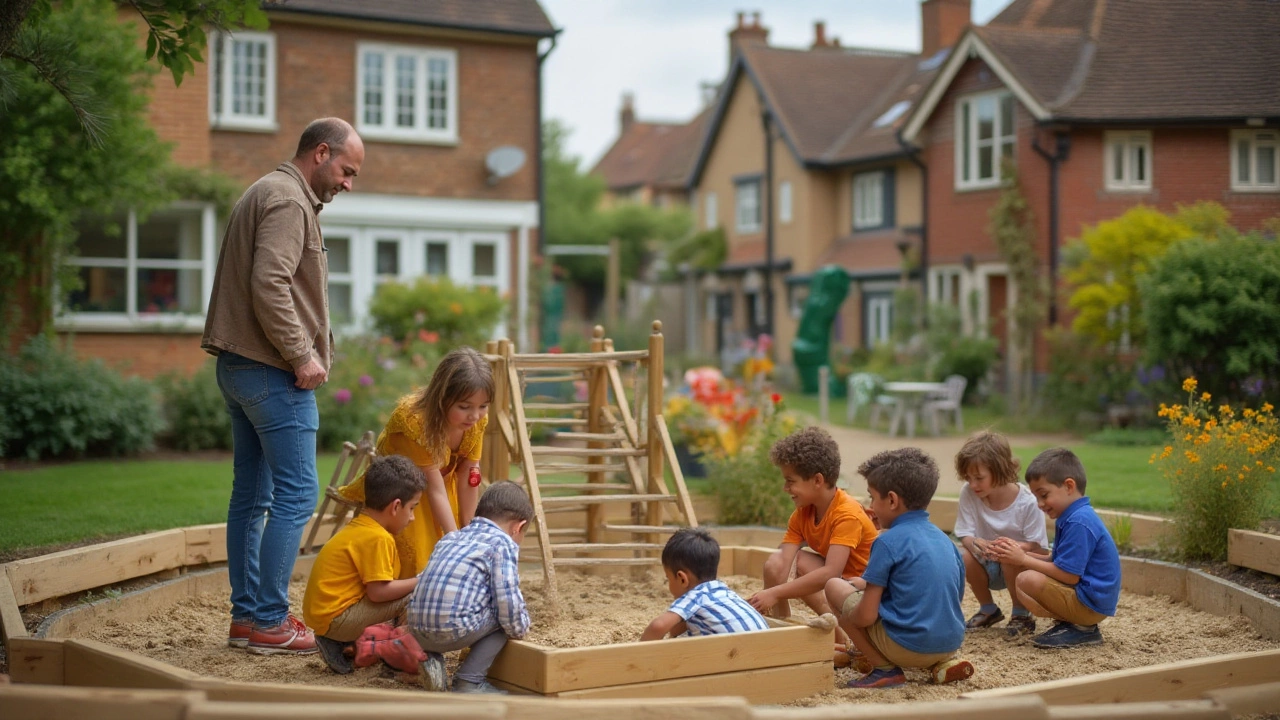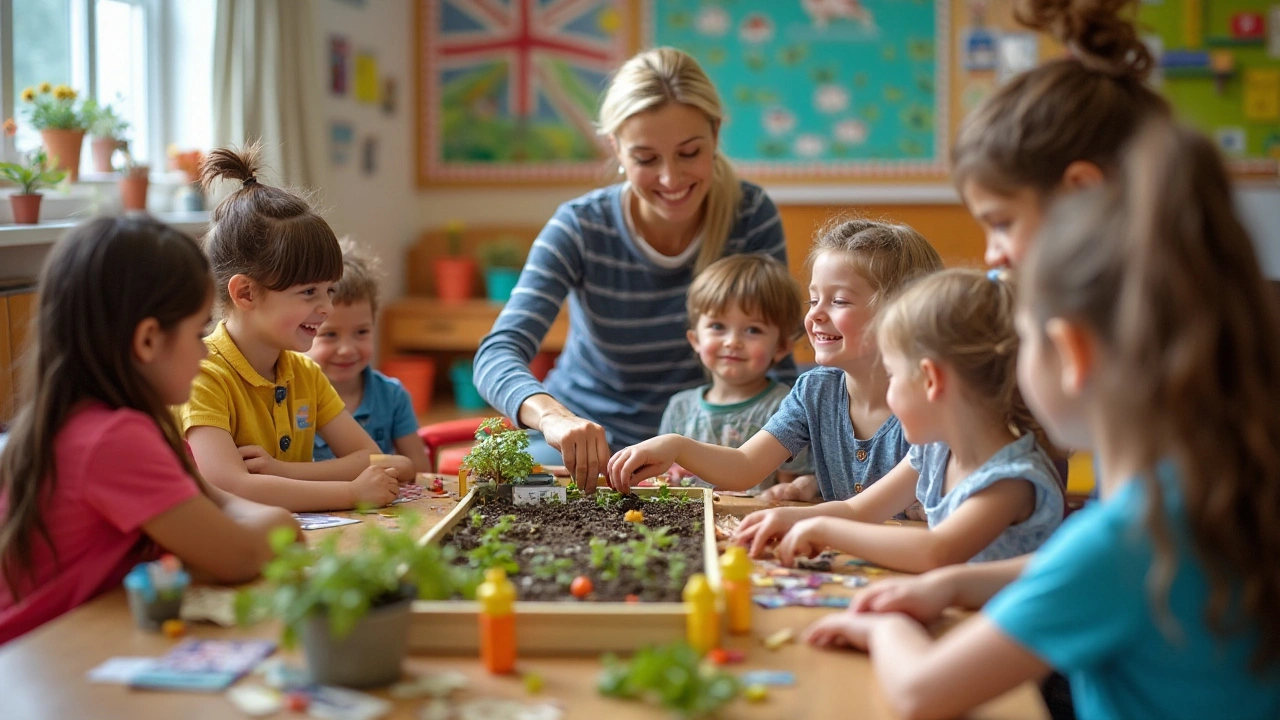An early years educator is much more than a teacher; they are facilitators of wonder and curiosity in the developing minds of young children. By fostering a supportive and stimulating environment, they help lay the groundwork for lifelong learning and personal growth. These educators guide children through their formative years with care and attention, considering each child's unique pace and style of learning.
The essence of their role lies in creating meaningful interactions and experiences that promote all facets of development—social, cognitive, physical, and emotional. Through play-based learning and structured activities, early years educators nurture skills and confidence in young learners, making a significant impact during these pivotal years.
- Defining the Role
- Essential Skills and Traits
- Creating the Learning Environment
- Impact on Child Development
Defining the Role
An early years educator is fundamental to the initial educational interactions children have outside their home environment. At its core, this role involves much more than merely teaching the basics of the alphabet or numbers. It's about bringing education to life through engaging, age-appropriate activities, often embedded in play. Through such enriched interactions, educators support young children's journey in understanding the world around them.
The responsibilities of an early years educator are diverse and blend various facets of care and education. These educators often craft customized curriculums tailored to the developmental stages and emerging interests of the kids they teach. Young children are naturally curious, so it's crucial for educators to tune into this curiosity and use it to foster exploration and discovery. By creating a balance between structured learning and exploratory play, they help children build foundational skills in a fun, pressure-free way.
Observing and assessing each child's progress is another vital aspect of their role. Educators use these observations to guide future learning experiences, ensuring they meet individual needs. This process allows educators to adjust activities to challenge children adequately, helping them progress at their own pace. Successful early years educators are patient and adaptable, able to switch plans when something isn't working or when a new opportunity for learning presents itself during the day.
"The goal of early childhood education should be to activate the child's own natural desire to learn." — Maria Montessori
Another key component of their role is communication—not just with the children, but also with parents and guardians. Regular updates on a child's progress and daily experiences keep everyone on the same page and foster a collaborative approach to development. Encouraging parental involvement extends learning beyond the classroom and into the home environment, providing children with a cohesive and supportive educational journey.
The influence of an early years educator can have lasting impacts on a child's emotional and social growth. By cultivating a nurturing and inclusive environment, children learn to express themselves, develop friendships, and understand social norms. They learn to share, cooperate, and resolve conflicts, all under the careful guidance of their educator, who acts as both a mentor and a role model. An educator's encouragement helps children build the confidence they need to navigate the world.

Essential Skills and Traits
Being an early years educator is as much about heart as it is about skill. The ability to connect with young children, understand their needs, and inspire them through the art of learning is at the core of their essential qualities. Central to this role is emotional intelligence. A deep sense of empathy enables educators to relate to what children might be feeling, whether it's joy, uncertainty, or frustration. Such understanding helps in guiding children delicately through their emotions while fostering a safe and nurturing environment. Patience is invaluable while working with young minds that develop at their own unique paces.
Another crucial skill for an early years educator is creativity. This involves creating engaging and innovative learning experiences that stimulate curiosity and critical thinking in children. Through imaginative play, storytelling, and interactive lessons, educators can capture children's attention and make learning exciting. Organizational skills go hand in hand with creativity, enabling the educator to design and implement structured but flexible lesson plans. These plans must be adaptable to suit different learning styles and varying rates of progress.
Communication skills are fundamental when interacting with both children and their parents. Building a bridge of trust through clear and understanding communication enhances the relationship between home and school, making the educational experience more cohesive for the child. Listening actively to children allows educators to understand their interests and concerns, tailoring the learning experience to be more effective. According to the Great Schools Partnership, "Effective communication in children's education fosters community and collaboration, ensuring everyone involved contributes to the child's success."
Lastly, a strong foundation in child development knowledge is crucial for effective preschool education. Understanding how children grow and learn at different stages enables educators to provide age-appropriate challenges and support. They should remain curious and committed to continuous learning themselves, always seeking new ways to enhance their teaching methods. In this ever-evolving educational landscape, adaptability becomes an indispensable trait, ensuring educators can adjust to new educational research findings and technologies. It’s not just about teaching letters and numbers but nurturing the love for learning, laying a foundation for holistic development.

Creating the Learning Environment
In the world of early childhood education, the learning environment is somewhat of a magical realm. It is where minds expand, friendships bloom, and confidence takes root. An adept early years educator understands the significance of a well-designed space that caters not just to learning, but to a child's overall well-being and happiness. Much like a seed needs nourishing soil, children flourish when placed in environments that are stimulating, secure, and nurturing. To create such a setting, educators focus on every minute detail—from the color of the walls to the kinds of materials available at the child's fingertips.
The Physical Space
The physical attributes of a classroom play a pivotal role in the quality of education it provides. Environments are crafted to appeal to all the senses, as this multi-sensory approach helps in engaging young minds effectively. Classrooms often feature a mix of natural and artificial lighting, large windows, airy spaces, and a range of textures to explore. The furniture needs to be child-sized to ensure little ones can interact comfortably with their surroundings, enabling autonomy and self-direction.
An organized environment fosters a sense of security and routine, vital for young children. Classrooms are typically divided into various zones or activity stations—each serving a specific purpose, like a reading corner with cozy cushions, an art area with easels and vibrant paints, and a science nook with natural elements. These spaces not only cater to varying interests but encourage children to explore independently or collaboratively, nurturing both personal and social growth.
Materials and Resources
A successful learning environment is rich with materials that encourage curiosity and exploration. Open-ended resources like building blocks, puzzles, and clay are staples in a preschool education setup, allowing children to use their imagination freely and discover problem-solving skills. Rotating materials regularly keeps the environment fresh and engaging, motivating children to return to favorite activities while trying new ones. This balance of familiarity and novelty is key to maintaining children's enthusiasm for learning.
Carter, a leading figure in early childhood education states, "A thoughtfully curated environment serves as a silent curriculum, leading children through pathways of discovery."
Additionally, incorporating elements from the natural world—like plants, water tables, and real-life specimens—bridges the gap between indoors and the natural environment, enhancing sensory and experiential learning. Integrating technology, when appropriate, supports learning, but a human touch ensures that it does not overshadow fundamental play and social interaction, which are cornerstones of early development.
Creating a Safe and Inclusive Space
Safety is a fundamental aspect of any learning environment. Physical safety measures include properly padded floors, childproof fixtures, and vigilant supervision. Beyond physical safety, fostering an emotionally safe space where children feel respected and valued is crucial. An inclusive classroom celebrates diversity and encourages children to embrace differences. Storybooks, cultural artifacts, and activities reflecting various traditions and backgrounds ensure every child feels represented and equal.
Ultimately, a carefully crafted learning environment by a dedicated early years educator sets the stage for a child's educational journey. It encourages them to take risks, ask questions, and reflect on their experiences in meaningful ways. It's a living, breathing space that evolves with its little inhabitants, responding to their growing needs and endless curiosity.

Impact on Child Development
Early years educators hold an incredible power in shaping the initial phases of a child's journey through life. From one day to the next, children are absorbing everything like little sponges, and the guidance provided by these educators is crucial in establishing their developmental pathways. These early interactions are foundational, affecting not only immediate cognitive and social growth but also setting the stage for future learning and behavior patterns. Researchers have consistently highlighted how critical the first few years of life are, showcasing that children who have access to quality early education are more likely to excel in school, show better socialization skills, and have a strong emotional foundation.
One of the most significant roles of an early years educator involves nurturing the social and emotional skills of young children. They are often the first source of learning how to interact with peers, understand emotions, and develop empathy. These skills set children up for success in later relationships and collaborative environments. It's an educator’s task to create a safe, welcoming space where children feel valued and understood, helping them to express their feelings and thoughts with confidence. Constant encouragement and positive reinforcement boost self-esteem and can drastically influence how a child views themselves and their place in the world.
In terms of cognitive development, early years educators introduce concepts through playful yet purposeful learning activities. They seamlessly integrate literacy and numeracy principles into everyday experiences, which can include stories, games, or even routines. This early exposure plays a pivotal role in forming neural connections that will underpin a child’s future learning capabilities. Children are naturally curious and imaginative, and the savvy educator taps into this natural inclination to explore, prompting questions, and stimulating problem-solving skills. According to a study by the National Association for the Education of Young Children, early interventions in cognitive learning can enhance a child's ability to concentrate, follow directions, and handle challenging tasks.
A strong foundation in the early years significantly increases the probability of success in all areas of life. — James Heckman, Nobel Prize-winning economist.
Let's not forget the importance of physical development, often championed by early years educators through activities that promote motor skills. Whether it’s dance, climbing, or art, these activities develop fine and gross motor skills, which are indispensable for everyday tasks. Children learn coordination, balance, and spatial awareness in these settings, which not only fosters a love for physical activity but also translates into better health outcomes. Importantly, these activities are often designed to be inclusive, ensuring that each child can participate to the best of their abilities, fostering an early sense of achievement and independence.
A great early years educator continuously assesses a child's developmental needs and adapts strategies to meet those needs, understanding that each child is unique. They understand the power of their influence and how the combination of nurturing, teaching, and caring can truly transform a child's potential. The impact of this role is far-reaching, sowing seeds that will grow as the child advances through life. The evidence is clear: quality early education boosts not just academic outcomes but also children’s social and emotional well-being, resilience, and lifelong opportunities. With a keen eye for each child's unique talents and needs, these educators are the unsung architects of a brighter future.


Write a comment